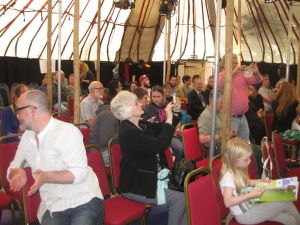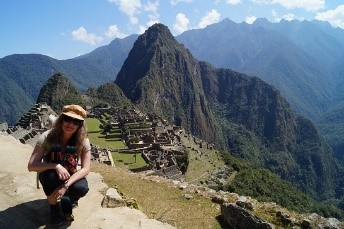On Saturday 8th August, Jemina Napier and Noel O’Connell engaged in a heated debate on “Hearing Loss or Deaf Gain?” at the Cabaret of Dangerous Ideas.
We’ve asked two members of LINCS, Heather Mole, a PhD student who is part of the BSL team, and Olwyn Alexander, Director of Academic English, to review the show.
Heather Mole writes: At Edinburgh’s Fringe Festival, in St. Andrew’s Square, there is a yurt where dangerous ideas, backed by research, are being debated and discussed, thanks to the Beltane Public Engagement Network. For the third year in a row now Heriot Watt’s BSL team have picked topics of interest from Deaf Studies. This year the issue up for debate was “Hearing Loss or Deaf Gain?” Researchers Jemina Napier and Noel O’Connell took on the challenge of engaging the audience and trying to convince them that either the definition ‘hearing loss’ was sufficient for deaf people, or perhaps the term ‘Deaf gain’ would be a better alternative.

Dr Noel O’Connell and Prof Jemina Napier
Susan Morrison, our compere for the afternoon took on the role of a Martian (dressed in a woolly hat with a third eye) who wanted to find out from Earth people what this ‘deafness’ thing was and which definition the Martian’s would decide to use themselves – should she go with the positive gain of being Deaf, or the negativity of a definition which involves ‘loss’?

Susan Morrison being interpreted by Andy Carmichael
With an audience of over 50 people, Jemina (hearing) and Noel (Deaf) took to the floor. They covered various issues during their debate including: Sound, Danger, Access, Communication and Visuality. Most hearing people think that not being able to hear people’s voices, or the calming, emotive or exciting impact that music has is a loss and a disadvantage in life. Noel pointed out that deaf people can enjoy music through vibration through the feet and body if they choose to, and that they have the benefit of being able to stand next to the speakers at a concert without any difficulty or concern for their hearing! It became clear that sign language users also benefit from being able to talk without losing their voices in this type of environment too (even though strobe lighting might make them look a little robotic).
Next up was Jemina’s concern that deaf people could be in danger because they cannot hear alarms, or children crying, for example. But this was easily combatted by Noel as he explained that with strobe or vibrating alarms and child monitors there really isn’t any difficulty for deaf people to be alerted to the same dangers or concerns. And additionally it was a benefit to be able to sleep through unwanted noise, like noisy neighbours, freight trains or sirens. Something I’m pretty jealous of right now, living under a flat that hosts festival goers throughout August.
At this point, Jemina realised she needed to up her game! So she brought up the issue of access to announcements, at train stations, or in airports. Surely this was hearing loss, a disadvantage of deafness. Noel reminded her that due to new technologies and apps, plus visual information being more and more available on public transport, this really wasn’t as much of an issue as she had imagined. And at this juncture we learned that the reason texting has become so popular and so widely available across different networks (something that was restricted in the early days of mobile phones) was thanks to the deaf community campaigning. So that certainly gave the argument for Deaf Gain an extra point!
The discussion moved on to communication and the fact that deaf people need sign language interpreters to communicate which must be a loss in terms of their freedom to access everything they want. Noel agreed that this could be frustrating at times, but there is an additional benefit to using a sign language. Imagine going abroad on your holiday? If you don’t speak any other languages apart from English, you may have difficulty making yourself understood. He explained that because of the visual and iconic nature of sign languages signers are able, through gesture and visuality, to make themselves understood and create a pidgin language very easily. In fact there is a phenomenon known as International Sign Language which is in essence a pidgin and it’s used at conferences and between signers from different countries. Jemina, subverting her own argument, gave the example of the Deaflympics (the Deaf Olympics, separate from the Paralympics) where rather than seeing the teams sticking to their country groupings were mixing and using International Sign to communicate.

Noel and Jemina debating…
Finally, they turned their attention to the visuality of deaf people. Noel gave us the example of how deaf people can communicate over distances and through windows without difficulty, something hearing people cannot. Jemina countered that though signing is so useful over distances if everyone signed then nothing would be private. But we were informed of the benefits of being able to sign under water (by Jemina again) and how in one situation two signers were diving and one panicked, but the other person was able to calm them down using sign language. If it had been a non-signing person the crude and basic gestures for ‘up’ and ‘down’ would have had little effect. Jemina, at this point, was hammering nails into her own coffin…. the audience were clearly finding the arguments for Deaf Gain pretty convincing.
Susan took the microphone and offered the floor to the audience to make sure they had a chance to ask their questions. The audience were very obliging and gave countless examples of Deaf Gain :- reestablishing a friendship through train windows, the nature of Sign Language which allows the expression of concepts that spoken language cannot, the invention of the wing mirror by a deaf person (Arthur James Wilson), the benefits of babysign, cheaper car insurance for deaf people because they are less distracted (!), better napping for deaf people (!) and due to the energetic nature of sign language the health benefits (losing the bingo-wings)! Not to mention ‘sniper-heckling’ from one young member of the audience who was secretly signing her comments to the presenters. I could go on…..
It was acknowledged during the question period that if a person was born deaf they would not ‘miss’ hearing music or spoken language because they had never heard it. However for people who are losing their hearing or have become hard of hearing later in life there are of course challenges and a sense of grief in losing the ability to communicate easily or enjoy the music they once did.
At the end of questions and comments Susan-the-Martian asked the audience to vote – hearing loss or Deaf Gain? You can probably tell which way it went. It was, though, perhaps a surprise that only one person voted for ‘hearing loss’ in the entire yurt.
So who’s going to write to the Oxford English Dictionary and let them know that ‘hearing loss’ has fallen out of usage and submit the new description of Deaf Gain?

The audience in the Yurt

Jemina Napier and the two interpreters – Yvonne Waddell and Andy Carmichael
For an article about the academic concept of Deaf Gain by H-Dirksen L. Bauman, Ph.D., and Joseph M. Murray, Ph.D follow this link.
Or for a facebook site dedicated to ideas about Deaf Gain go here.
Olwyn Alexander writes: The Cabaret of Dangerous Ideas is part of the Beltane Engagement Network, which aims to make academic research accessible to a wide variety of audiences. On Saturday 8th August LINCS colleagues Jemina Napier and Noel O’Connell held a light-hearted debate on attitudes to deafness under the title Hearing Loss or Deaf Gain.
It was clear from the beginning that the audience comprised many from the deaf community as the visual cacophony before the show started was… er, deafening! The debate proceeded through a series of themes, such as sound, danger, access, communication, which enabled Jemina and Noel to tell witty stories about the benefits of signing if not the benefits of being deaf.
Jemina initially took the Devil’s Advocate position, challenging Noel to explain how he could appreciate music, listen to announcements on trains and planes or know when a fire alarm was sounding. Noel responded by explaining how he could appreciate music through vibrations and could stand right next to the speakers in a crowded bar or disco while speaking to a friend at the same time. Jemina countered with a very funny jerky display of how a signer might jumble a message on account of strobe lighting in the disco.
The two debaters then told more funny stories about their experiences of being able to communicate with friends across noisy streets or between trains passing one another or through the windows of cafés or even under water, before handing over to the audience to ask questions and tell their own stories. Members of the audience got up on stage to sign their stories and one even performed a little magic turn by pointing to a couple of women in the audience to tell them that one was called Fiona and they had met each other in Stirling. Gasps of admiration all round until he explained that he had “eye-dropped” (cf eavesdropped) on them as they were waiting in the queue for tickets.
I certainly learned some things I didn’t know before, for example about how visual and three-dimensional signing is and how signers’ peripheral vision becomes immensely sharpened so they are able to take in fast moving signals more quickly than hearing folk. I was also impressed at how much signing is a whole-body performance in a way that speaking isn’t and how much confidence that gave deaf people to stand up on a stage and tell their stories in very witty ways.
I laughed a lot and would recommend everyone to take in other sign language shows – definitely a great way to start my Festival going.







